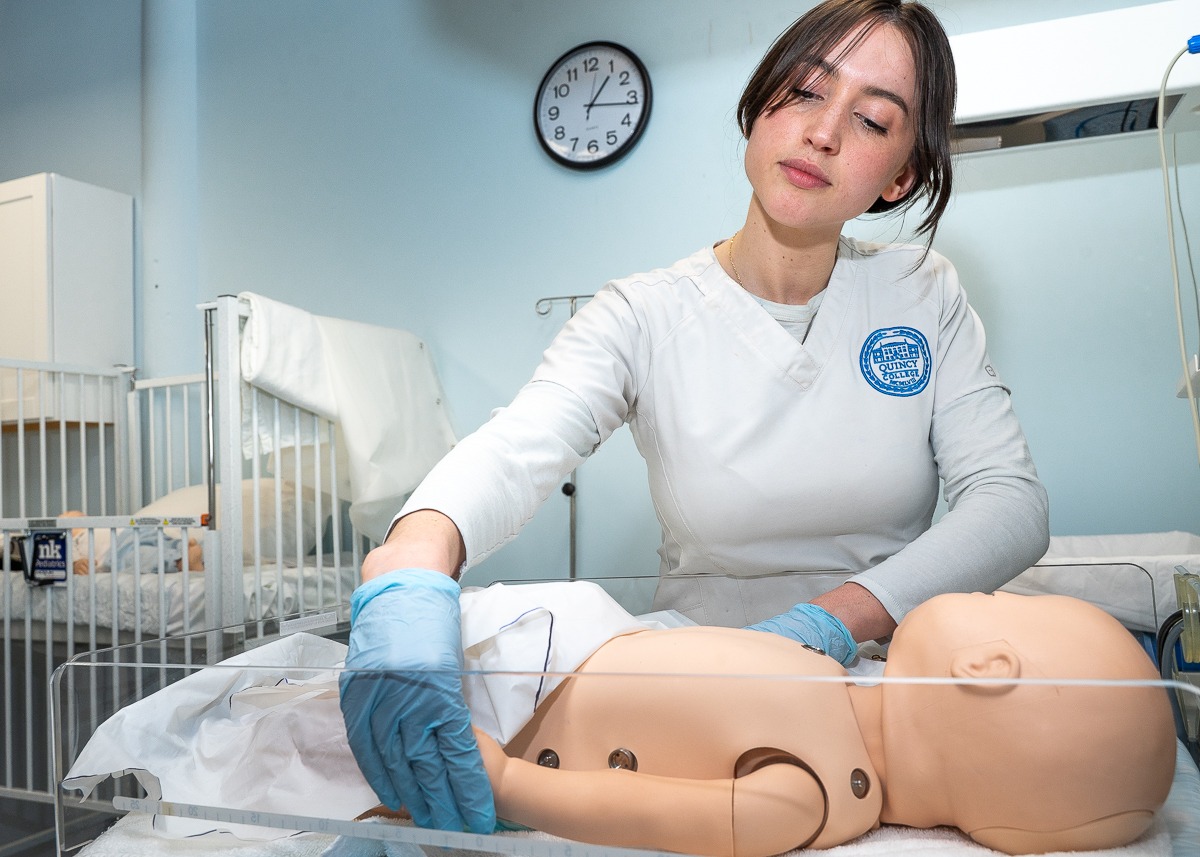Adam Coste took a roundabout route to nursing.
He dropped out of Plymouth North High School in ninth grade, at the age of 16, in 2014. The next year-and-a-half, he said, was a blur.
“I was working random jobs, trying to make myself useful in society,” Coste said.
Eleven years later, he is one of a growing number of students interested in nursing who are helping to revive the Plymouth campus of Quincy College at Cordage Park.
When Coste graduates, he will enter a marketplace where nurses are in heavy demand.
A long-developing shortage of nurses nationwide was made worse by the Covid-19 pandemic, Diane Gillis, the college’s dean of nursing, said. That’s opened many opportunities for clinical partnerships for students to learn, and for hospitals to become acquainted with potential recruits, she said.
“It’s a very opportune time for someone to consider nursing, economically,” she said, adding that competition for nurses has increased salaries.
Registered nurse graduates earn between $80,000 and $120,000 a year, Gillis said.
The Plymouth campus offers two nursing degrees. Thirty-five students are enrolled in the registered nursing program that costs between $40,000 and $48,000 a year, depending on how many prerequisite credits a student has.

For Coste, 27, the road to nursing school was an unusual one.
At 18, he enlisted in the Army. Over the course of six years, he served in the infantry as a sniper and as a team leader, including a period in 2020 when he was stationed on the Mexico border.
“I realized I didn’t want to do that,” Coste said of serving in the military as a career.
After six years in the Army, he got a job working security at Beth Israel Deaconess Hospital-Plymouth, where he discovered his calling in the emergency room.
“I saw a lot of people’s worst days,” Coste said. “Pretty chaotic, but I felt looking around – seeing what health care was as a team effort looking at an individual and trying to give them the best
health care possible – I wanted to have a bigger role in that.”
Coste is in his first year at Quincy College. He has already earned supervised clinical experience at Falmouth Hospital and South Shore Hospital in Weymouth.
He finds working in an emergency department appealing.
“That kind of controlled chaos environment, I do well in that,” he said.
Working at a Veterans Administration hospital is also an option.
Coste is using his GI Bill benefits to pay for his education as a registered nurse.
The other nursing option at Quincy College, a10-month licensed practical nurse program, costs $20,000. Graduates can earn $65,000 or more a year, Gillis said. But no students are enrolled in that program at Plymouth this year.
Graduates of either program must pass an exam to get the license that allows them to practice.

Fiona Callahan, in her second year of the registered nurse program, will graduate this year.
Callahan, 25, said she has been interested in health, particularly nutrition, since middle school.
That interest became more intensely personal when she was on vacation in Florida. Callahan’s appendix ruptured on her 16th birthday.
“The whole team of nurses on the pediatric floor made me a huge birthday basket and came in and sang to me,” she recalled. “Even though it was a really bad birthday experience, that part of it was really nice and thoughtful.”
Seeing how compassionate the nurses were was eye-opening, she said.
“That just made me want to do what they did,” said Callahan, who graduated from Plymouth North.
When she started taking courses at Quincy College, she was still considering opening her own nutrition business.
“I was trying to go to school for business here, and nothing seemed to fit,” Callahan said. “I kept considering nursing and considering it and considering it and I kept going back to it.”
She said she brings her positivity to her interactions with patients.
“And I do feel like that, from what I’ve seen, makes a difference and makes their stay more tolerable,” she said.
She is now receiving supervised clinical training at South Shore Hospital and has also had “clinicals” at Beth Israel Deaconess Hospital Plymouth, Falmouth Hospital, Saint Luke’s Hospital in New Bedford, and at a a school in Scituate.
The nursing program also partners with Cape Cod Hospital in Hyannis, Life Care Center of Plymouth, and Harbor Community Health Center in Plymouth, among others, Gillis said.
Callahan, who lives in downtown Plymouth, is thinking of applying for jobs nearby, although she said she has also considered applying at Tufts Medical Center, in Boston.
“I would love to get into a labor and delivery unit, if possible,” she said.
The Cordage Park campus opened in 1993, and at one time occupied two floors. The pandemic led to more online learning, and it consolidated to the ground floor two years ago. Fewer students attend in person than did before the pandemic, but overall enrollment has increased since 2021, said Scott Pickard, the college’s director of public relations and communications, in part due to interest in nursing and other courses of study in the health field, such as the physical therapist assistant, pharmacy technician, and certified nursing assistant programs. Pickard said an increasing number of students are also enrolling in the prerequisite classes they need to apply for the nursing and allied health programs.
The Plymouth campus has two full-time faculty members, a part-timer, and an instructor, Gillis said. She admits that the pandemic, which caused a shortage of nurses, also made it difficult to recruit instructors, but Coste and Callahan said they are happy with their education.
Callahan said her cohort of students has formed a strong relationship with the staff at Quincy College.
“I’ve had some bad days and they’ve been just so helpful and open to accommodate those bad days,” said Coste, who considers the school’s small size a benefit.
Fred Thys can be reached at fred@plymouthindependent.org.

